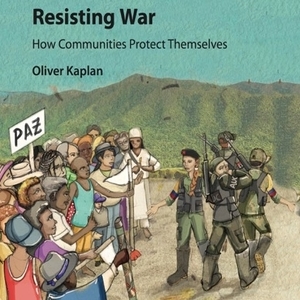Resisting War: How Communities Protect Themselves

Speaker: Dr. Oliver Kaplan (University of Denver)
Date: 8 August 2019
Speaker Session Preview
SMA hosted a speaker session presented by Dr. Oliver Kaplan (University of Denver) as a part of its SMA Minerva Speaker Series.
His presentation focused on his book, entitled Resisting War: How Communities Protect Themselves. In his book, Dr. Kaplan looks at instances of civilian agency in order to determine how those who do not have power can influence those who do have power (and weapons), as well as how effective and how common these nonviolent movements usually are. Moreover, he stresses the importance of understanding community organization and culture. During the brief, Dr. Kaplan explained that civilians looking to protect themselves either create formally organized peace communities that argue for their own protection or repurpose pre-existing informal and local councils to do so. There are also two types of strategies that civilians implement when advocating for their own security: 1) covert, internal-facing strategies and 2) overt, external-facing strategies. These covert strategies include creating mechanisms for internal dispute resolution and developing early warning systems to avoid instances of violence, while overt strategies include putting public pressure on, and creating opportunities for dialogue with, armed groups. Next, Dr. Kaplan used Cundinamarca, Colombia as an example to explore these dynamics. Cundinamarca suffered a fair amount of pressure from guerilla fighters and paramilitary troops beginning in the mid-1990s through the mid-2000s, and their “junta” councils were essentially ineffective. Dr. Kaplan spoke about the importance of these junta councils and organizational capacity in general, highlighting that the towns in Cundinamarca that had the most junta councils had significantly fewer instances of civilian rebellion and conflict. Dr. Kaplan also explained the importance of community organization through the perspective of paramilitary fighters and ex-combatants. He stated that these fighters are willing to respect and pay attention to these communities, as long as they are united. In metaphorical terms, “a single swallow doesn’t make a summer.” This belief highlights the importance of having a civilian organization to back up nonviolent strategies. To conclude, Dr. Kaplan provided a series of implications for operators, while stressing that US decision makers must think about civilians as agents, place them in the center of our decision making, understand their preferences, and engage them in their own protection.
Speaker Session Audio File
To access a recording of this session, please email Ms. Nicole Omundson (nomundson@nsiteam.com).
Briefing Materials
Biography:
Dr. Oliver Kaplan is an Associate Professor at the Josef Korbel School of International Studies at the University of Denver in Colorado. He is also the Director of the Latin America Center and Associate Director of Human Trafficking Center at the same institution. Dr. Kaplan received his Ph.D. in political science from Stanford University. He has conducted field research in Colombia and the Philippines and is also a regular blogger on Political Violence @ a Glance.
The SMA Minerva Speaker Series description and list of the other sessions in this series can be downloaded here.
Comments